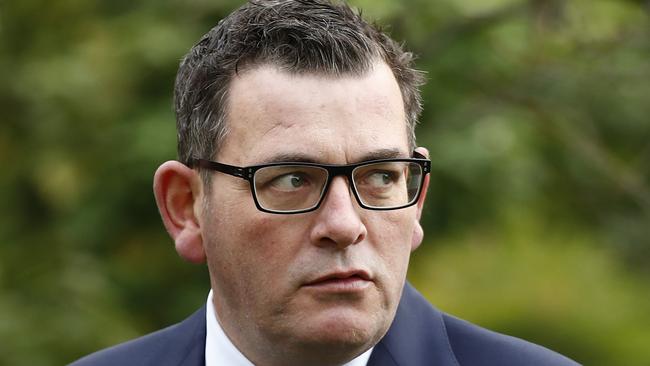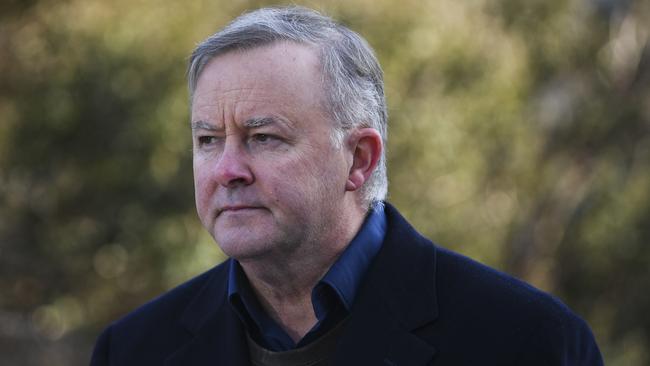What really went down in the Labor Party and why it matters
To understand where the Labor Party is going it helps to ignore the fine words coming from politicians like “reform” and “democracy” and understand how their power works and it’s all about not wanting to lose.
To understand what just happened in Victorian politics, where things are likely to head, and why it matters, you have to know how power works in the Labor Party.
And to do that, it helps if you ignore the fine words coming from politicians like “reform” and “democracy”, and especially any rhetoric you might have heard about “letting genuine members have their say”.
The best analogy for what just happened was provided by a Liberal MP, who said it was like watching a group of people going down in a game of Monopoly turn the board over because they couldn’t stand to lose.
To understand why they were losing, and why that was so unacceptable to them, you need to understand that in addition to the division that we read about between Left and Right of the ALP, there two other divisions that matters almost as much.

DEEP DIVISIONS
The first is the division between those whose power in the party comes from the trade unions and those whose power comes from their control of numbers in the state’s Federal Electorate Assemblies (FEAs). The second is the division between Spring St and Canberra. The pre-eminent Victorian Labor powerbrokers over recent decades, the men who have decided how things roll, Robert Ray, Bill Shorten, Stephen Conroy and Kim Carr have all had powerbases in the unions.
The idea that Adem Somyurek, a man with no union background, a former electorate officer turned member of state parliament’s upper house, could count for more in the Victorian Labor Party, than say, Richard Marles, the deputy leader in Canberra, was repugnant to the natural order of things and not to be borne.
But until Monday morning, that was how things stood in Victorian Labor. Through patient negotiation Somyurek’s alliance of right-wing unions, breakaway left-wing unions and right-faction warlords who control members in the FEAs of suburban Melbourne, had reached pre-eminence, an ascendancy sealed last year when it took control of Labor’s head office in the Docklands.
As it turned out, the FEA warlords were the group’s greatest vulnerability.
POWER SOURCE
Union secretaries control how their organisations’ numbers are used in internal ALP elections absolutely. If all of them were ever to agree among themselves about how something should go, there would be no way of stopping it. The suburban warlords are a different matter.
Union secretaries get their power wholesale, suburban FEA warlords get theirs from their retail ability to manage relationships between the sub-warlords who are in turn responsible for recruiting and renewing the party memberships or ‘stacks’ as they are known.
Who qualifies as a stack? Well anyone who doesn’t pay for themselves for a start. Apart from that hard definition, the answer is in the eye of the beholder, that is to say, you stack, whereas I have a whole lot of genuine members who just happen not speak very much English and hand their ballot papers over to me whenever there is an internal election. And everyone does it. Everyone. Every single Labor member of parliament has either done it themselves or been selected by a machine that does it. But it’s against party rules and a bad look when you get caught.

UNEASY EAST
Nowhere do things get more willing between the different sides of the Labor Party over FEA numbers than the southeast of Melbourne. In the Victorian Labor Party “the southeast” is code for bandit country, where the stacking wars of yesteryear are the stuff of legend. It was the heartland of Somyurek’s operation. It is also where Daniel Andrews got his start in politics, working in the office of the former MP for Bruce, Alan Griffin. I should make it clear, he himself has never branch-stacked. We know this because he told us so on Monday. Asked about it explicitly, he said: “I follow the party’s rules, I’m the leader of the party and I don’t think I’ve got much more to add to that. No.” Perhaps because he has clean hands in this space the Premier felt free to move so decisively against those who had. Whatever, the case he has certainly not wasted the crisis.
MEMBERSHIP PURGE
By the end of the week, the entire party machine in Victoria had effectively been destroyed with all decisions of substance, including preselections, to be taken by the party’s national executive until 2023. During that time the party’s membership will be purged of anyone with the taint of a stack upon them. If the only people remaining are genuine local members this a good thing, you might think. But it isn’t that simple. If power in the Labor Party were to end up in the hands of genuine local members its position on most issues would be indistinguishable from the Greens Party. Even if think that’s desirable, removing stacks won’t empower the leftovers because the position of the union secretaries would be unchanged – indeed without the branch-stacking warlords their power would be greatly increased, something it didn’t take them long to grasp.

UNIONS UNITED
At week’s end they were talking loudly about stopping national intervention in the courts and had already received preliminary advice there’s a very good chance it will be ruled invalid. Even if they ultimately lose it could take more than a year, if not longer, for the matter to wend its way through appeal courts. That would be a disaster for Daniel Andrews and Anthony Albanese and the unions know it. Which is why it is likely a peace deal will emerge in the next few days which allows the defenestration of the FEA warlords to continue unchecked while the party is governed under some sort of power-sharing arrangement between union bosses and the party’s federal and state leaders. As one union secretary said to me yesterday, they aren’t going to have their power truncated for three years “because of some shenanigans out in the southeast” and “we see this as a real opportunity to get bigger and stronger”. So there you are, the ultimate beneficiaries of Daniel Andrews’ clean up of the Labor Party will be the union bosses. The upside for him is in the meantime his caucus, which was growing restless, will become completely cowered because of their terror they will lose their preselections. And Anthony Albanese? Well it won’t have escaped his notice that it will pretty hard for Bill Shorten to win a leadership ballot of members if no one from his home state of Victoria is eligible to vote.
RELATED
IBAC TO JOIN PROBE INTO LABOR CORRUPTION SCANDAL
MP’S HATE-FILLED TEXTS UNLEASH ABUSE ON LABOR MATES

